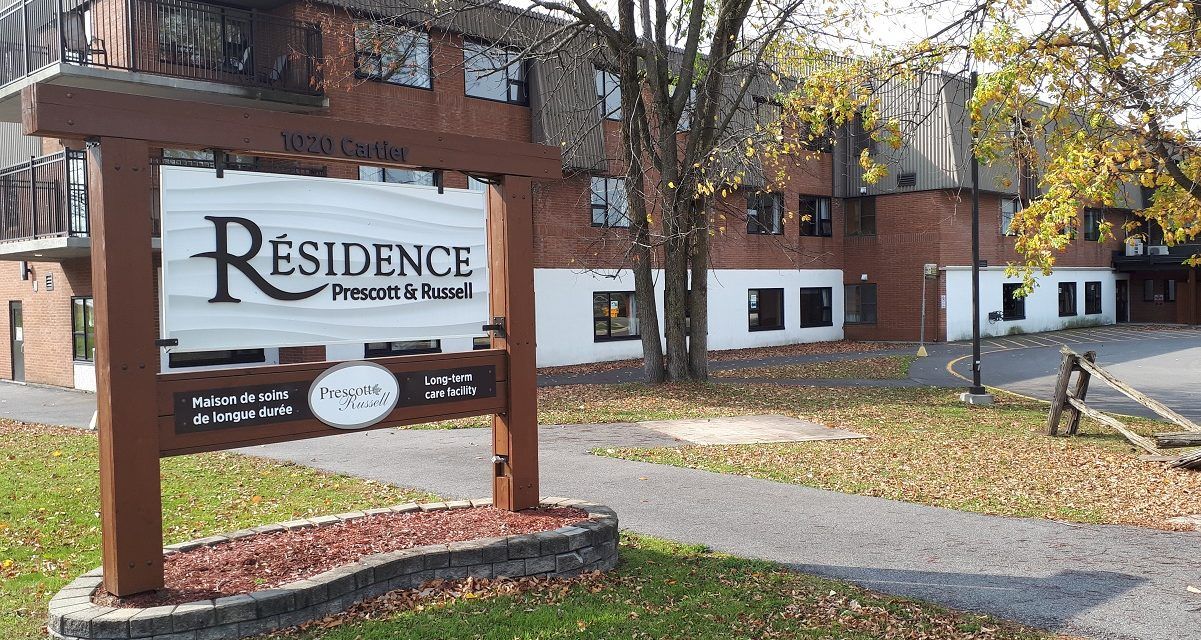The Chief Administrative Officer (CAO) for the United Counties of Prescott and Russell has acknowledged that the COVID-19 outbreak at the Prescott and Russell Residence led to challenges with communication about the situation. Staff and management have been facing criticism as people complained that they were not receiving updates about their family members living at Prescott and Russell Residence. The situation was made worse because visits by family members were severely restricted during this time.
Stéphane Parisien knows that communication between the Residence and those with designated Powers of Attorney (POA) for residents was not as timely as it could have been, due to the overwhelming nature of the situation.
The outbreak at Prescott and Russell Residence and the shortage of care staff has been covered by national news outlets in recent weeks.
As of December 7, 109 residents at the 146-bed, UCPR owned and operated facility in Hawkesbury had tested positive for COVID-19 since the official outbreak began on October 9. The outbreak has also resulted in 14 resident deaths.
The outbreak has also affected 68 staff members, which Parisien says also made it a challenge to have enough people available to communicate with the designated POA for each affected resident.
Parisien said he understands it is difficult for family members who are not designated (having a resident’s POA) to find out that they cannot obtain information about their loved one’s health.
“The only person we could talk to is the POA,” he said.
When the authorized POA’s were notified, they were understandably concerned and wanted extensive details and explanations involving the health of the person whom they were responsible for and the outbreak situation at the Residence.
Parisien said that due to the details involved and the questions people asked, those phone calls were not simple, 30-second explanations, which led to a slower rate of communication with a shortage of staff.
“These calls ended up being fairly lengthy,” said Parisien.
“We’re not used to doing this; we’ve never had to do it before,” he added.
As for how the outbreak at the Prescott and Russell Residence began, all that Parisien would says is that “we have a theory,” but he did not want to explain exactly what it was out of respect for the confidentiality of the people involved.
Parisien did however express some concern over how during the summer and early autumn, the Ontario government temporarily allowed long-term care patients to visit the homes of family members and stay overnight.
The UCPR and Residence management are considering a preventative measure to keep any future COVID-19 outbreaks under tighter control. No new residents have been admitted to the facility since the pandemic began, leaving only 130 of the 146 beds at the Residence currently occupied. Parisien said they are considering keeping one wing of the Residence completely empty so any future patients who test positive can be isolated there.
However, Parisien said that analysis of any additional costs or impact on Residence revenue will be done before a decision on leaving a wing vacant is made.
Parisien acknowledged that the staffing shortage at the height of the outbreak made it challenging to provide basic care for residents.
“We were falling into critical levels of providing services,” he said.
UCPR paramedics were assisting with the situation, but Parisien said that providing services was even a struggle with their assistance. He said that staffing needs could only be planned in three-day blocks because it was uncertain what the availability of staff would be beyond that amount of time. The Hawkesbury and District General Hospital was also unable to provide staff to assist at the Residence due to its own staffing needs having to be met. The UCPR was also unable to get assistance from a staffing agency it tried to obtain services from.
The paramedic service in Renfrew County offered to send some of its personnel to help at the Residence, but the UCPR instead used new part-time recruits at its own service to work at the Residence.
The Canadian Red Cross provided 24 of its personnel to assist at the Residence. Parisien said the use of the Red Cross came about in a rather confusing way because it evolved from unofficial posts on social media.
He said that there were limits to what the Red Cross could do because not all of its personnel have the same training as a nurse or personal support worker (PSW). As a result, the Red Cross role was limited to infection control and cleaning.
As for what could be done differently, Parisien said the time it takes to find out COVID-19 testing results must be shortened, and he said online communication needs to improve.
“I’d be a bit more proactive with the social media,” he said.
Parisien defended the leadership of Residence Administrator Alexandre Gorman and said “he hasn’t missed a beat.”
He said that Gorman was assisting with patient needs on the facility’s floors.
“Management and staff were not in their offices doing paperwork,” Parisien said.


